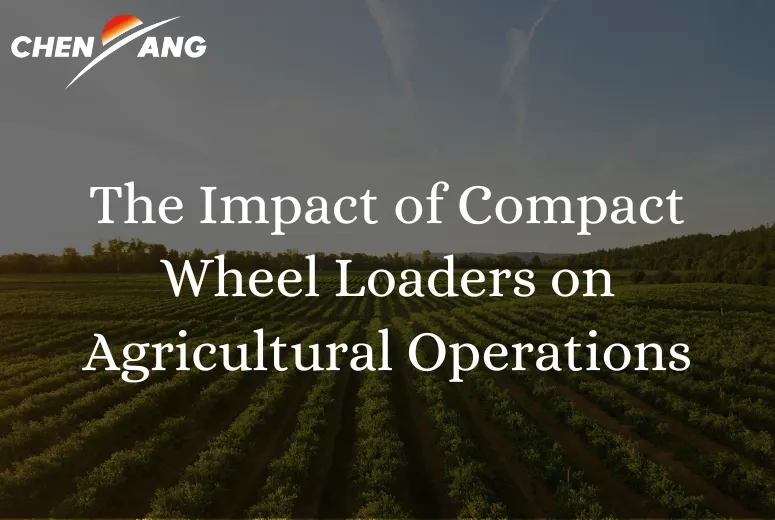The Impact of Compact Wheel Loaders on Agricultural Operations
In modern agriculture, the efficiency and effectiveness of machinery play a pivotal role in determining the success of operations. Compact wheel loaders, with their powerful capabilities and versatile design, have become essential tools in agricultural settings. From improving labor productivity to increasing operational efficiency, these machines have significantly impacted the way farming tasks are performed. Their ability to navigate challenging terrains and perform a wide range of functions makes them indispensable in a variety of agricultural contexts. This article explores how compact wheel loaders are transforming agricultural operations, enhancing productivity, and ensuring the sustainability of farming practices.

Enhancing Versatility in Farming Tasks With Compact Wheel Loaders
Agriculture requires a variety of tasks to be completed daily, from material handling and loading to digging and grading. Traditionally, farmers relied on several types of specialized equipment for different tasks. Precision slitting line, however, have become the ultimate multifunctional machines that can handle a wide range of operations. These loaders are equipped with versatile attachments, including buckets, forks, and pallet forks, that can be swapped out depending on the task at hand.
Whether it's loading feed into a truck, moving hay bales, or clearing debris from fields, compact wheel loaders provide the flexibility to tackle various jobs with ease. Their ability to quickly switch attachments ensures that farming operations stay efficient, reducing the need for multiple pieces of equipment. This versatility not only saves time but also minimizes the costs associated with maintaining several machines, making compact wheel loaders an incredibly cost-effective solution for agricultural operations.
Improving Efficiency in Material Handling With Compact Wheel Loaders
Material handling is one of the most time-consuming tasks on any farm. Whether it's moving bulk feed, fertilizer, mulch, or harvested crops, these materials need to be transported from one place to another in an efficient manner. Construction loaders are ideally suited for this role, as they offer excellent lifting capacity, quick cycle times, and the ability to navigate tight spaces.
With their powerful hydraulic systems and lifting capabilities, compact wheel loaders can transport heavy loads with ease. This reduces the amount of manual labor required and ensures that tasks are completed quickly. For example, instead of relying on manual labor or smaller, less powerful machines to load feed or crops, farmers can use compact wheel loaders to complete the same tasks faster and more efficiently. The improved handling of materials not only speeds up daily operations but also contributes to higher productivity throughout the farming season.
Navigating Challenging Terrains About Compact Wheel Loaders
Farming operations often take place in rural areas where uneven ground, muddy fields, and rough terrain can make machinery operation difficult. Compact wheel loaders excel in such environments due to their design and features. With a smaller, more compact frame, they are highly maneuverable and can access areas that would be difficult or impossible for larger equipment to reach.
These loaders are designed with a low ground pressure, which allows them to distribute their weight more evenly across the ground, reducing the risk of soil compaction. This is especially important in agriculture, where preserving the health of the soil is critical for long-term productivity. Additionally, compact wheel loaders are equipped with all-wheel drive systems that provide excellent traction on uneven and slippery surfaces. Whether it’s working in wet conditions, navigating through fields, or handling rugged landscapes, these machines ensure that agricultural operations can continue without interruption, even in challenging conditions.
Enhancing Labor Productivity With Compact Wheel Loaders
Labor shortages and rising labor costs are significant challenges in the agriculture sector. Farmers are increasingly looking for ways to streamline their operations and reduce dependence on manual labor. Compact wheel loaders play a key role in this process by automating and speeding up many tasks that would otherwise require considerable human effort.
For example, loading materials, moving crops, or even assisting with excavation tasks such as creating drainage channels or leveling soil are all operations that compact wheel loaders can perform more efficiently than manual labor. This allows workers to focus on other essential tasks, improving overall labor productivity. Furthermore, since compact wheel loaders can replace several pieces of specialized equipment, farmers can reduce the need for a large workforce and instead use a smaller, more skilled team to operate the machines. The increased productivity achieved through the use of these loaders ultimately leads to better profitability and operational sustainability.
Reducing Operational Costs With Compact Wheel Loaders
For farmers, managing costs is always a top priority. Compact wheel loaders contribute to reducing operational expenses in several ways. First, their fuel-efficient engines help lower the cost of operation, making them a more affordable choice for farmers who rely on heavy machinery for everyday tasks. Additionally, their multi-functional capabilities reduce the need for multiple machines on-site, cutting down on both equipment acquisition costs and maintenance expenses.
These loaders are also designed for durability, meaning they require less frequent repairs and have a longer lifespan than some other types of machinery. Their robust construction ensures that they can withstand the rigors of daily agricultural use, making them a long-term investment for farms of all sizes. By reducing the need for repairs, maintenance, and fuel consumption, compact wheel loaders contribute to lowering the overall cost of farm operations.
-
Low Maintenance + High Availability of Ownership for Mining Dump TruckNewsJul.17,2025
-
Drum Drive Axle + Air Suspension for Electric Tractor TruckNewsJul.17,2025
-
33m Boom + Full Hydraulic Outriggers: Narrow-Site Construction Practices of Mixer Pump TruckNewsJul.17,2025
-
18L Large Drum + Extended Drain Interval of Gear Oil for Heavy Duty TrucksNewsJul.17,2025
-
13m Cargo Space + Polyurethane Insulation: Long-Term Cold Chain Protection Solutions for Refrigerated Semi-Trailers for SaleNewsJul.17,2025
-
10T Water Tank + 2.5MPa Fire Pump Efficiency Analysis of Water Tank Fire TruckNewsJul.17,2025
Popular products

























